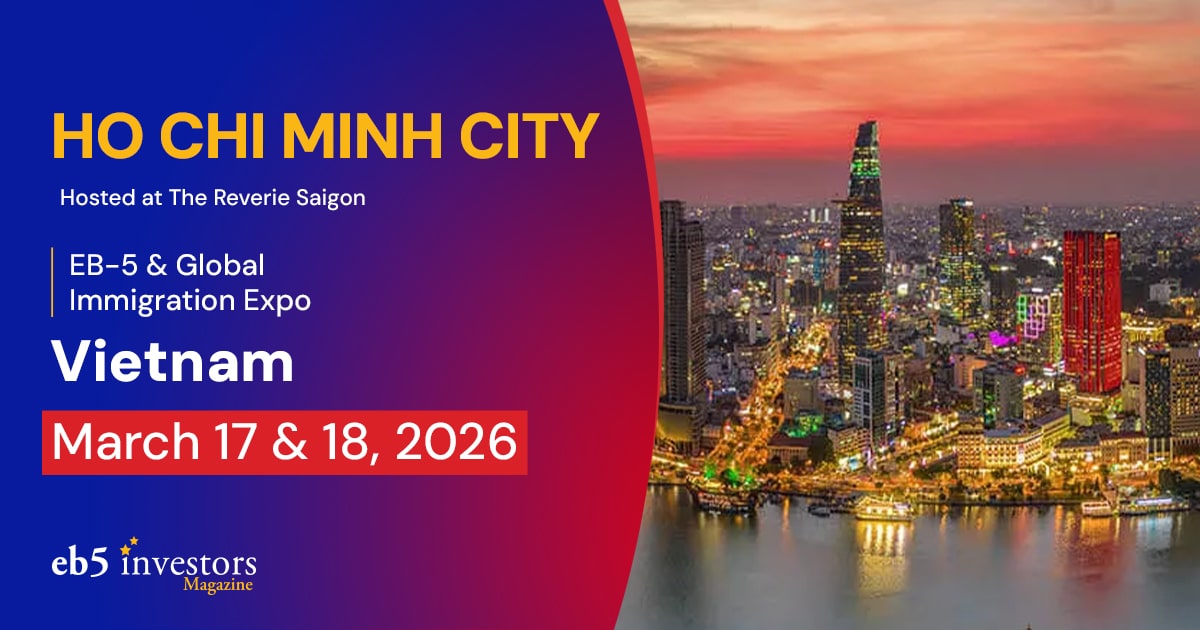
By EB5Investors.com Staff
- The E-2 visa allows citizens from treaty countries to invest in and run a business in the U.S.
- You must make a “substantial investment” and actively manage the business.
- No minimum investment amount is defined, but typically $100,000+ is recommended.
- The visa is temporary but renewable indefinitely as long as the business stays active.
- Spouses can apply for work authorization; children under 21 can attend school.
- You cannot apply for a green card directly from E-2, but transitions are possible.
Since the E-2 visa is a treaty-based visa, it should be noted right away that there are many countries that do not have E-2 treaties with the United States and whose nationals, thus, are not eligible for this visa. The largest of these ineligible nations are: China, India, Brazil and Russia. You can read the entire list of eligible treaty countries here.
The E-2 visa may be an attractive option for investors who have considered EB-5 and who are from an eligible treaty country. The purpose of this article is to help investors determine if the E-2 is appropriate, and provide a step-by-step guide to the application process.
What is the E-2 Visa?
The E-2 visa is an investment-based nonimmigrant visa for entrepreneurs who want to come the United States to open and operate a business. The regulations refer to it as a “Treaty Investor Visa” and this simply means that there must be a treaty between the investor’s country of origin and the United States that allows the investor to apply for the E-2. As mentioned above, China, India, Russia and Brazil are a few of the larger countries not eligible.
The E-2 visa allows owners and directors to bring essential employees from their home country to help with their business. Furthermore, the visa does not have strict job requirements, unlike the EB-5 program. However, the foreign national must demonstrate that the business can generate significantly more income than required to provide a living for the foreign national, which means creating jobs and having a positive impact on the U.S. economy.
The E-2 visa allows spouses and unmarried children under 21 to enter the United States with the principal applicant. They are permitted to work and attend school without hindrances.
It is important to keep in mind that the E-2 does not lead directly to permanent residency, however, the visa can be extended indefinitely, as there is no cap on duration. While some investors may see this as a limitation, there are many investors who do not have the immediate objective of permanent residency. Even so, there are still permanent residency options for those investors who wish to seek a green card at a later date while on E-2 status.
Eligibility
The first eligibility criterion is the nationality of the investor. Only investors from countries on this list are eligible to apply for the visa. Once treaty eligibility is established, the investor must satisfy several more criteria. An analysis of these criteria is below:
How much money needs to be invested?
The regulations do not specify an exact investment amount required for the E-2 visa. However, there are many clues to help determine a “safe” amount. The first clue being that the investment must be substantial. To determine whether an investment is substantial, the consular officer will perform a “proportionality test.” The test is an evaluation of the following two figures: Amount of investment vs. cost of buying or creating an established business. Here is an example to illustrate:
Giorgio from Italy is applying for an E-2 visa to open a brand new coffee shop in Hollywood. He has invested $150,000.
- Scenario 1: With his application, he submits evidence that an existing coffee shop in the neighborhood sold for $150,000 last year. In this case, Giorgio has proven that his investment is 100 percent proportional to the cost of buying an existing coffee shop. ($150,000 investment vs. $150,000 cost of established business).
- Scenario 2: This time Giorgio submits his application showing that he has invested $150,000 but he does not have evidence of another coffee shop selling at that price. Instead he gets a letter from the Hollywood Chamber of Commerce showing that the average cost for starting a coffee shop in Hollywood is $125,000. He also provides a letter from a local coffee shop explaining that their startup costs were only $100,000. Here Giorgio has also likely proven that his investment is proportional. ($150,000 investment vs. $100-125,000 cost to start a coffee shop).
An important note here is that the more expensive a business, the less proportional the investment has to be. For example, a consulting firm can become operational and successful with an upfront investment as low as $60,000 (arguably even less), however a large manufacturing facility requires a much larger investment to operate due to the cost of lease, equipment, employees, etc. Therefore, if the proposed business is a consulting firm, it is highly advisable that the investor commits the entire amount prior to application. However, if the proposed business is one that typically requires substantial infrastructure, investors may satisfy the officer with a smaller fraction of the investment amount. Many consulates use the following scales:
- For businesses requiring an investment of less than $500,000, it is recommended that 85 percent to 100 percent of the funds are invested prior to filing;
- For businesses requiring between $500,000 to $3 million, 50 percent investment is sufficient.
- For businesses greater than $3 million, 30 percent is considered substantial.
Furthermore, the amount of the investment must be sufficient to show the investor’s commitment to the success of the business. If the consular officer believes that the investor is worth $100 million, it is unlikely that a $60,000 investment will convince the officer of his/her commitment. On the other hand, for the average investor worth $300,000, a sum of $100,000 will likely be considered large enough to prove commitment to the success of the business.
When does the money have to be invested?
The proposed business must be very close to being operational at the time of filing the E-2 petition. This means that the consular officer would like to see that the funds and assets have been irrevocably committed to the enterprise. A business that merely exists on paper, with speculative or idle investment does not qualify. Investments do not yet have to be deployed in their entirety, but investors should be prepared to document how a significant portion of funds has already been spent and how they intend to spend the rest. Here are some general rules for normal expenditures:
- Rent: Investors CANNOT count the entire value of the lease, but only count the duration paid prior to filing. Investors who have not yet taken possession of the space can count one month of rent.
- New goods or equipment: Investors CAN count the full value of all equipment that is purchased for the business.
- Existing goods or equipment: Investors CAN count the total amount of previously purchased equipment so long as they can prove that the equipment will be used for business purposes.
- Other expenses: Expenses for marketing, branding, web design, etc. CAN be used in their full values towards the E-2 investment. Proper documentation must be submitted to prove these expenses.
It should be noted here that many E-2 investors wish to purchase existing businesses but also wish to protect themselves from massive loss in the event that the application is denied. In these cases, the regulations allow for the investor to enter an escrow agreement where release of the purchase funds is contingent on approval of the E-2 petition.
How to prove the investment
Though not as stringent as the EB-5 process, the E-2 also requires the investor to prove the source of the investment funds. There are two parts to proving the source of funds to the consular officer:
- First, the investor must show the possession and control of the invested funds. This requirement can be satisfied by providing documentation showing how the money was acquired. The regulations allow money derived from income, gift or inheritance. Funds derived from a loan are only eligible if the investor is personally liable for the loan.
- Second, the applicant must prove that the investment came from lawful sources. Typically, this requirement is satisfied by the documentation provided for item 1 above. Sometimes multiple layers of documentation are required. For example, if the funds were earned through the sale of real estate, applicants may have to show proof of the sale and proof of how the funds were earned to purchase the real estate in the first place.
Which documents are required?
Different consulates may have slightly differing criteria but applicants will likely be required to provide a variety of documents, including lease and purchase agreements, bank statements, receipts and purchase orders, wage history, documentation of gifts or real estate sale and business plans.
Application process
Because E-2 approval is reliant on the development of a business, the entire process requires complex calculations, market research and advanced planning. As such, interested parties are encouraged to consult with legal counsel and advisors as early on in the process as possible.
Interested investors can petition for E-2 classification through Form I-129 to change their status from another legal classification if already in the United States, or by filing Form I-129 from outside of the United States.






